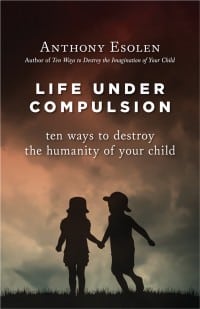J.D. Vance, venture capitalist and author of Hillbilly Elegy, speaks on the American Dream and our Civilizational Crisis....
What John Milton and a Theme Park Can Teach You about Childhood
The following is an excerpt from Anthony Esolen’s new book, Life Under Compulsion, which is available for 30% off as ISI’s Book of the Month!
“Get ready for a better world.”
The motto belongs not to political revolutionaries or Silicon Valley visionaries but to a children’s theme park popular in more than a dozen countries, and coming soon to a city near you. This park is not like the other entertainment options available to families. Children here do not scamper onto roller coasters; they pretend to be adults.
As a reporter from the New Yorker described it, “children can work on a car assembly line, or move furniture, or put out a fake fire with real water.” Through role playing in adult occupations, they earn a “salary” that can be “deposited in the central bank and accessed with a realistic-looking debit card”—after a “tax” of 20 percent is deducted. (“Here is a fun way we teach them to pay tax,” says the company’s founder and CEO.) Their pretend money can be used to purchase goods and services at stores operated by very real corporate sponsors—Sony, McDonald’s, Coca-Cola, Domino’s Pizza, and many others. (The park offers “a good platform in terms of building brand loyalty,” another executive boasts.)
This theme park, unusual though it may be in its field, reflects an understanding of childhood that has become all too common. It is childhood as mere preparation for adulthood, and a dull, drab, limited adulthood at that. Every year millions of parents take their children to this theme park, happily handing over the large admission fee, so that their children can . . . what? So they can take their position on an assembly line, or deliver packages, or prepare fast food, or make plastics, to earn enough to amass the latest consumer gadgets and pay their taxes to an unseen government overlord. Here we see a firm commitment to the tyranny of the useful. Consider: Children attending the theme park quickly learn that the less interesting the job, the more it pays. And the adult staffers end their conversations with children by saying, “Have a productive day.”
How is this theme park creating a “better world”? The CEO has the answer: “We are empowering [children] to become independent.”
Independence. Freedom. Liberty. These have become bywords of our time. And yet we hardly understand the terms at all anymore.
Children are often called our greatest resource, as if they were deposits of tin. But a child is not (just as an adult is not) a lever in an economic machine, a vehicle for commerce, a revenue source for the all-powerful state. He is a human being, made in the image and likeness of God—made, that is, for goodness and truth and beauty.
But those concepts have disappeared in the contemporary celebration of “freedom.” The assumption is now nearly automatic that freedom is without substance. It is an extrinsic condition, and a negative at that. It means that there are no strings upon the autonomous self. It is, as I have suggested above, freedom as license, as a permission slip to do as you please. It is freedom that worships the abstraction of choice: choice is the only thing that matters; whether it is one choice or another matters not at all.
This narrow and misguided understanding of freedom is now pervasive, but it is not new. Milton’s Satan, having fallen from Heaven to Hell, looks about to find a dismal place, flat and dreary, a land of sulfurous bogs and bitumen, marl instead of good soil, stench instead of fresh air. But he remains undaunted, or strives hard to appear so. “Here at least,” he says, “we shall be free.”
This is the assertion of an incorrigible brat. No one, not God Himself, can tell Satan what to do. That is why Satan calls the angel Gabriel a “proud limitary Cherub,” sneering at his exercise of authority within the limits prescribed by God. It’s also why the fellow demon Mammon advises against repentance, which, even if it were possible, would force “new subjection” on them, in which they would sing to God “forced Hallelujahs” and send up to Him their “servile offerings.” In Hell, says Mammon, they will be “free and to none accountable,” preferring “Hard liberty before the easy yoke / Of servile pomp.”
But how much “liberty” does such substanceless freedom offer? “Nobody can tell me what to do,” says the adolescent, except that everyone is ceaselessly at his ear, urging him, enticing him, rasping him, needling him, goading him, telling him that unless he does something, anything, he will waste his life, he will be no one. And the something that he absolutely must do is invariably political, narrowly defined, or economic, narrowly defined, or sexual, mechanically defined. He must rule, or make money, or “perform.”
Welcome to Life Under Compulsion.
Get the Collegiate Experience You Hunger For
Your time at college is too important to get a shallow education in which viewpoints are shut out and rigorous discussion is shut down.
Explore intellectual conservatism
Join a vibrant community of students and scholars
Defend your principles
Join the ISI community. Membership is free.

